Cold air intakes and induction kits and the effect on performance.
"Suck it and see - induction kits."
Improving the Suck – if you put a piece of cloth over your mouth and suck in air you will not have too much of a problem but if the cloth were wet or a double thickness things start to get harder. Your engine, just like you, needs to breathe air.
The air filter is a very necessary part of the engine unless you are operating in a laboratory so the aim is to get an efficient air filter that is not too thick and is not oily, greasy or dirty. This is where induction kits and sports panel air filters come in.
But do induction kits and high flow air filters always add power to the engine?
In this article we will discuss the different types of filters (RAM, Cone, Panel etc...) and materials used, look at the issue of engine bay temperatures and how this affects intake temperatures and suggest the best approach for a variety of different engine sizes and types.
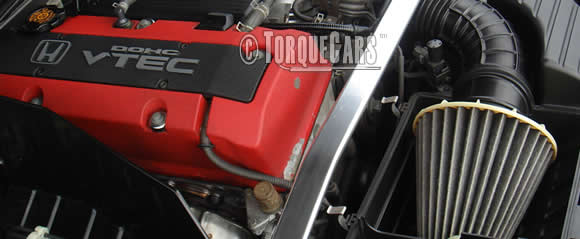
TorqueCars have looked at the various types of filter materials available today and we have concluded that the best filters for flow rates use lightly oiled cotton gauze as their filtration medium.
These are not particularly easy to come by for most applications, so for the average fast road car we would recommend going with one constructed from sponge impregnated with a dirt retentive spray or one of the modern artificial gauze filters as shown above.
This slight coating of oil will aid filtration. As an alternative to sponge get a filter which comprises layers of a fine grade metallic mesh as both of these will flow better than the standard paper filter.
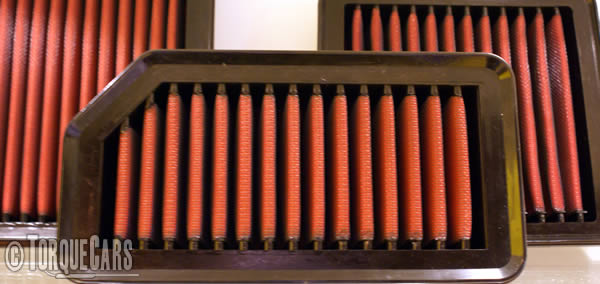
The oil sprays for air filters have been traced to problems with the mass air flow sensor. This is generally down to the use of too much oil and improper fitting. We must stress that you should only use a light coating of oil on the air intake side of the filter. It is a good idea to clean the mass air flow sensor periodically anyway.
The bigger the surface area of the filter the better the air flow will be. Mainstream cars today can be fitted with an air induction kit which completely replaces the air intake box.
The plus is much better air flow, particularly at higher revs, and the induction roar as air is sucked into the engine the downside is also the roar - some people dislike the extra noise these kits create.
Smaller engined cars can actually lose power when an induction kit instead of an air filter is fitted. It can be challenging to deliver COLD air (which carries more oxygen) to the engine as the temperature under the bonnet can get quite high and and a 20 degrees rise in temperature can rob you of up to 3% of your power!
Under bonnet temperatures can quickly rise to double this. An intercooler can be added on turbo and forced induction cars which is then also sprayed with Co2 and reduces the temperature of the air intake.
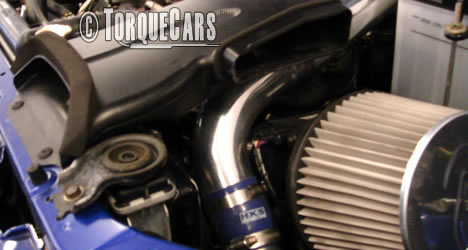
It should be noted that in some small engine non turbo applications the car will feel less powerful with an induction kit.
In these instances the best option is a direct replacement panel air filter which goes in the standard airbox.
Sucking warm air in from the engine is a great way to lose power.
Make sure you have a cold air feed pipe to get cool air from outside of the engine bay - cold air carries more oxygen.
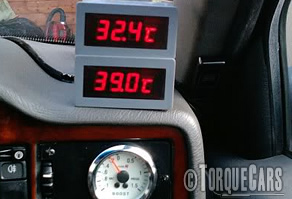
It is also good practice to seal the induction kit off from the engine with a box of some description.
Recently one of our members (Claymore) ran some tests with and without an airbox and came up with the following interesting results with a cone induction kit.
1) With an air box the intake temps dropped to ambient within 1/4 of a mile of driving.
2) Without an air box, the car had to be driven for 2 miles before the intake temperatures dropped.
If you are doing a quarter mile run, then an open cone filter is next to useless without a cold air feed, as the engine bay will be quite hot for the entire run, even with a heat shield.
If you had a cold air feed from the outside via a vent then intake temps would be substantially lower and you wouldn't need to run the car any distance to clear out the engine bay temperatures.
So the best air induction kits come with a cold air feed pipe and are fitted in an air box which shields the intake air from the high under bonnet temperatures – the best compromise between the standard air intake box and the induction kit. Some kits have a long pipe which the filter sits at the end nearest the bonnet which really does help cut down the noise and improves the intake temperature.
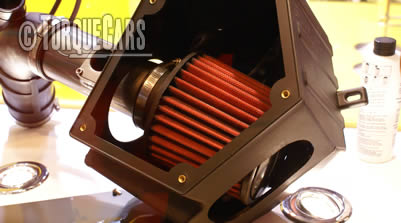
Induction kits that protrude under the front bumper which claim to get more air forced in through the pressure built up on the front of the car as it cuts through air do not have significant power gains.
Other than the benefit of the cold air from outside the engine bay, - the RAM effect takes speeds up over 100 mph before a benefit is realised - they are however a great way to collect many botanical specimens of flies, moths and bugs in the air filter!
NB: Be careful where you site the cold air feed - the last thing you want is to be sucking water into the engine every time you splash through a puddle.
If the induction kits air filter is enclosed in a box with a cold air feed, then more power can be obtained avoiding the hot under bonnet air (Carbon fibre boxes are very good for their heat shielding and durability). It also good to wrap a the exhaust manifold with a heat resistant material to keep the under bonnet temperatures down and tasteful vents can be added to the bonnet to take away the heat.
Induction kits sometimes come with a guarantee of "more power". In reality though, the power gains are so small, on small engined cars, they would not be noticeable in real life. Secondly the power increase tends to be at the higher end of the rev range and your low down power band will suffer.
So to summarise, if you have a large engined car (or an engine with good low to mid range torque) fit an induction kit with a cold air feed. If you have a small engined car or one with little power in the lower rev band fit a direct replacement sports panel air filter.
Please join us in our friendly tuning forum where you will find 1000's of common sense car specific tuning tips and recommendations.
Just don't expect to get noticeable power gains from an induction kit alone and you won't be disappointed. The best reasons for getting one is to experience the induction roar sound or to save money long term on filters as induction kits and sports panel filters are generally washable.
If you liked this page please share it with your friends, drop a link to it in your favourite forum or use the bookmarking options to save it to your social media profile.
Check out TorqueCars new YouTube channel, and see their awesome new content...
Feedback
Please use our forums if you wish to ask a tuning question, and please note we do not sell parts or services, we are just an online magazine.
Help us improve, leave a suggestion or tip
